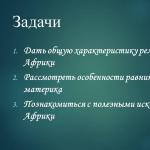Along with
pretext
The adverbial phrases “along with + noun” can be distinguished by punctuation marks (commas). For more information about the factors influencing the placement of punctuation marks, see Appendix 1. ()
And according to an analogy unclear to him in his memory along with this dark figure appeared another, an episode of distant childhood arose in the soul . V. Korolenko, Fedor Bespriyutny. And it seemed for minutes that they were going to some kind of holiday; strange, but almost everyone who went to execution felt the same, along with sadness and horror, We were vaguely happy about the extraordinary thing that was about to happen. L. Andreev, The Story of the Seven Hanged Men. I believe, however, that it was not a turtle at all, but a glyptodon - an animal from the armadillo family that lived on Earth in the Pliocene epoch of the Tertiary period along with huge anteaters, giant sloths, mastodons and huge rhinoceroses. V. Obruchev, Plutonia. At first, just what, along with praises for my art, I haven’t heard enough! V. Kataev, Grass of oblivion.
Dictionary-reference book on punctuation. - M.: Reference and information Internet portal GRAMOTA.RU. V. V. Svintsov, V. M. Pakhomov, I. V. Filatova. 2010 .
See what “along with” is in other dictionaries:
along with- along... Spelling dictionary-reference book
along with- along/… Spelling difficult adverbs
ALONG- ALONG, adv., with whom (what). Equally, equally. Speaker N. with the best athletes. Along with whom (what), prev. with creativity together with whom than n., simultaneously with what n. Along with treatment, prevention is carried out. Along with the masters in the pool... ... Dictionary Ozhegova
ALONG- ALONG, adv., with whom than (book). The same, on the same terms. Women worked alongside men. || Together with someone, on an equal basis, simultaneously with something (book). Along with the tram we use the bus. I confessed to everything, but... Ushakov's Explanatory Dictionary
along with- adv. with whom with what. 1. Equally, under the same rights and conditions; on a par. To speak n. with the best athletes. 2. At the same time, together with whom, than l. Receive the Order of N. with all expedition participants. ◁ Along with this; along with that, union. Book... encyclopedic Dictionary
along with- on equal rights, equally, equally, on equal terms Dictionary of Russian synonyms. along with unism. on par with Dictionary of Russian synonyms. Context 5.0 Informatics. 2012… Synonym dictionary
Along with- sentence with creativity; = along with Efremova’s Explanatory Dictionary. T. F. Efremova. 2000...
along with- sentence with creativity; = along with 1. Corresponds in meaning to the word: on the same terms, on an equal basis with someone or with something. 2. Corresponds in meaning to the word: together, simultaneously with someone or with something. 3. Corresponds in meaning to the following: in... ... Modern explanatory dictionary of the Russian language by Efremova
Along with- ALONG, adv., with whom than. Equally, equally. Speaker N. with the best athletes. Ozhegov's explanatory dictionary. S.I. Ozhegov, N.Yu. Shvedova. 1949 1992 … Ozhegov's Explanatory Dictionary
along with- along with / with, preposition with creative. Along with the masters, schoolchildren train in the pool... Together. Apart. Hyphenated.
Along with- adv. 1. Equally, on the same terms, on an equal basis. // Together with whom l., than l.; simultaneously. // In comparison with whom l., than l. 2. outdated At the same level, in the same row Efremova’s Explanatory Dictionary. T. F. Efremova. 2000... Modern explanatory dictionary of the Russian language by Efremova
Books
- Geodesy. Problem book, M. A. Girshberg. Along with the tasks tutorial contains questions on the theoretical part of the discipline GEODESY and provides the formulas necessary to solve problems. For higher education students educational institutions By…
Along with (and along with) this, along with the fact that
Along with (and along with) this, along with the fact that ALONG, adv., with someone. Equally, equally. Speaker N. with the best athletes.
Ozhegov's Explanatory Dictionary. S.I. Ozhegov, N.Yu. Shvedova. 1949-1992 .
See what “Along with (and along with) this, along with that” is in other dictionaries:
ALONG, adv., with whom (what). Equally, equally. Speaker N. with the best athletes. Along with whom (what), prev. with creativity together with whom than n., simultaneously with what n. Along with treatment, prevention is carried out. Along with the masters in the pool... ... Ozhegov's Explanatory Dictionary
adv. with whom with what. 1. Equally, under the same rights and conditions; on a par. To speak n. with the best athletes. 2. At the same time, together with whom, than l. Receive the Order of N. with all expedition participants. ◁ Along with this; along with that, union. Book... encyclopedic Dictionary
along with- adv. see also along with this, along with that, along with whom what. 1) Equally, under the same rights and conditions; on a par. Perform alongside/with the best athletes. 2) At the same time, together with whom, than l. Receive the Order of the People... Dictionary of many expressions
The total area of planet Earth is 510 million km2. The land area accounts for 149 million km2, the World Ocean occupies 361 million km2. Both land and ocean are inhabited by plants and animals. The variety of both is very great. It has now been established... Biological encyclopedia
- 'WHAT IS PHILOSOPHY?' ('Qu est ce que la philosophie?', Les Editions de Minuit, 1991) book by Deleuze and Guattari. According to the authors’ thoughts, indicated in the Introduction, ‘what is philosophy’ is a question that is ‘asked, hiding anxiety, closer to... ...
- (Qu est ce que la philosophie?, Les Editions de Minuit, 1991) book by Deleuze and Guattari. According to the authors’ thoughts, indicated in the Introduction, what is philosophy is a question that is asked, hiding anxiety, closer to midnight, when more... ... History of Philosophy: Encyclopedia
This question may seem far-fetched, because the answer to it seems to be completely clear: seasonings are what they season, flavor, ennoble food, add something to it that improves its overall taste. Conventional dictionaries interpret... ...
In any case, in addition, in addition, not only that, on top of everything, to top it all off, after all, to top it all off, at the same time, besides everything else, on top of that, to top it all off, again, to top it off, despite all this, still... Synonym dictionary
From detailed review The nutritional composition of my menu clearly shows that there are practically no food products that I would deliberately discriminate against and exclude completely from my diet. Even cocoa, chocolate, eggs,... ... Great encyclopedia culinary arts
Meat- (Meat) Definitions of meat, composition and properties of meat Definitions of meat, composition and properties of meat, culinary processing of meat Contents Contents 1. Composition and properties Autolysis of meat 2. History of meat consumption Meat eating in anthropogenesis Meat consumption in ... ... Investor Encyclopedia
Books
- How to move to another country and not die of homesickness. Dark night of the soul. Depression without rules. Mood - in an hour: how to get rid of depression (number of volumes: 4), Korzun Oksana. "How to move to another country and not die of homesickness." Hurray, it's done! Suitcases are packed, tickets are purchased, visas are issued, and you are ready to move. There is a new world ahead, unknown places...
- Dark night of the soul. Healing from depression, Rudiger Dahlke, Margit Dahlke. Abstract Depression is treatable - and the proof of this is the book you are holding in your hands. According to the authors, along with the obvious causes of depression - life losses, adversity,...
PUNCTUATION FOR PURPOSE WITH NON-PRIMINATIVE1 PREPOSITIONS
General rules
Circumstances can be introduced into a sentence using non-primitive (derivative) prepositions - simple ( thanks to, despite, as a result of, contrary to, according to etc.) and composites ( depending on, in order to avoid, in connection with, for lack of and etc.). Such constructions can be isolated, but the punctuation difficulty is that their isolation is not always appropriate, and sometimes even erroneous.
Turnover is isolated, if you need to indicate its boundaries (so that the sentence does not look ambiguous):
To avoid misunderstanding of the phrase by the director, changes have been made to the document. – To avoid misunderstanding the phrase, the director made changes to the document.
Turnover not isolated, if it is part of the predicate or is closely related to it in meaning. (As a rule, in such cases the phrase cannot be removed from the sentence without distorting the meaning of the phrase.) For example:
... Kazbich imagined that Azamat with father's consent stole his horse... M. Lermontov, Hero of our time. (Lermontov’s meaning: Kazbich imagined that Azamat’s father agreed to the theft.) Cf. change in meaning when the phrase is isolated: ... Kazbich imagined that Azamat, with his father’s consent, stole his horse...(=Kazbich imagined that Azamat stole the horse.)
Wed. Also: The sons of the wind divided the people against their wishes . I. Efremov, On the edge of the Oikumene. She walks through life with her head held high on par with a man, because freedom is impossible without full responsibility for one’s destiny. I. Efremov, The Razor's Edge. Evening was coming in Kolya's room according to the laws of nature, because the light had not been on there for a long time. L. Petrushevskaya, Vanya Kozel.
In other cases we can talk about optionality of segregation of turnover(depending on the degree of its prevalence, proximity to the main part of the sentence, word order in the sentence, author’s intent and other factors). In this case, a number of factors can be identified that influence the placement of punctuation marks.
Usually the revolutions are separated, which:
are located between the subject and the predicate: All you have to do is press your finger on the eyeball, and everything is real. items – as opposed to hallucinations- will split into two. A. and B. Strugatsky, Monday begins on Saturday. Left wall, as opposed to the right, reflected the concept of early death. I. Efremov, Hour of the Bull. AND mother, in spite of all misfortunes, gathered me, although no one from our village in the area had studied before. V. Rasputin, French lessons. Our fires burned all night, and ship, in case of emergency, was ready to sail. V. Jan, Phoenician ship. Dining table, depending on the circumstances, turned into a desk, then into a bed, when one of the friends who came from the front stayed overnight. V. Kaverin, Open book.
are not at the beginning or at the end of the sentence: Exactly at three o'clock, in accordance with labor laws, Doctor of Sciences Ambrosy Ambruazovich Vybegallo brought the keys. A. and B. Strugatsky, Monday begins on Saturday. ...I have re-examined the situation in Prague, which should become - on a par with Vienna and the Alpine redoubt- the center of a decisive battle against Bolshevism. Yu. Semenov, Seventeen moments of spring. At first, just what, along with praise for my art, I haven’t heard enough! V. Kataev, Grass of oblivion.
contain an explanation of what is said in the sentence and are highlighted intonationally: ... Children, due to being young, did not assign any positions, which, however, did not in the least prevent them from becoming completely lazy... I. Turgenev, Raspberry water. By the way, Bim had no idea due to lack of experience that no one ever counts time based on such dead half-roosters. G. Troepolsky, White Bim Black Ear.
However, other options are also possible punctuation, determined by the author's intention. For example: And yet, choosing a convenient moment, Khizhnyak in violation of all the rules went to overtake with right side and caught up with the Jeep...(V. Bogomolov, Moment of Truth) – failure to highlight the phrase located between the subject and the predicate; In the next morning thanks to numerous aliens in a quarter of an hour the skeleton of the new dugout was completed(V. Obruchev, Sannikov Land) – failure to highlight a phrase that is not at the beginning or at the end of a sentence.
In controversial cases, the final decision on punctuation marks is made by the author of the text.
Some patterns
Revolutions with the following prepositions may or may not be separated depending on the above conditions: thanks to, in view of, depending on, in violation of, in order to avoid, in fulfillment of, in contrast to, up to, in contrast to, in contrast to, in connection with, due to, as a result of, in case of, in accordance with, minus, for insufficiency, for lack of, for lack of, out of spite, on the basis of, in defiance of, along with, along with, in case of, under the guise, similarly, under the pretext, after, according to the measure, according to the standards, by right, for the reason, on the occasion, according to conditions, if available, subject to, against(meaning “contrary to”) , above(meaning “except, besides”) according to, accordingly.
Usually isolated(except for those cases when the phrase is part of the predicate or is closely related to it in meaning) phrases with verbal prepositions including, excluding, based on, starting from, despite, despite, depending on, judging by, and restrictive phrases with prepositions in spite of, for except except, regardless of, besides.
Usually not isolated phrases with prepositions instead of, in response to, as a result, like, at the expense of, like, on the contrary, without reaching, about, for the sake of, after.
1 All prepositions are divided into primitives and non-primitives (derivatives). Preformative prepositions- this is a small closed group of words that are not connected by living word-formation relationships with any significant words. These include prepositions such as in, behind, to, from, under and etc.
Non-primitive prepositions– prepositions that have living word-formation relationships and lexical-semantic connections with significant words - nouns, adverbs and verbs (gerunds). Non-primitive prepositions are much more numerous than primitive prepositions. All of them are divided into three groups: prenominal prepositions ( in view of, as a result of, with the exception of, like, about, under the guise etc.), adverbial ( on the contrary, like, according to etc.) and verbal ( including, excluding, not counting, after and etc.).
Some compound denominative prepositions that have retained living and close connections with the corresponding noun (for example: in contrast to, on the basis of, under the pretext etc.) are called prepositional combinations.
You often read news and large serious materials from reputable, respected publications on the Internet and catch yourself thinking: who is the author of these illiterate lines, where did they study, who taught them to use written Russian so ineptly. In addition to , a mistake in which, unfortunately, even specialist philologists make, many errors in the field of syntax and punctuation began to be found in the texts of would-be journalists.
Simply put, the question of where to put a comma, whether it is needed here or not, and if it is needed, then why, causes enormous difficulties for most writers. One gets the impression that they did not study this section of the Russian language either at school or at university, and they put punctuation marks where there is a pause in the language - this is where they strive to “stick” their “hook”. But in language, not everything is so simple - it has its own rules. MIR 24 decided to recall some of the punctuation features of the Russian language.
Punctuation is understood as a system of punctuation marks in the written language, the rules for their placement in writing, as well as a grammar section that studies these rules. Punctuation makes clear the syntactic and intonation structure of speech, highlighting individual sentences and members of sentences. This greatly facilitates oral reproduction of what has been written.
(along with colon and dash) is the most complex sign punctuation. In order to understand whether a given sentence uses a comma, you need to remember a few simple rules. In writing, this sign is used to highlight and isolate participial and participial phrases, definitions, isolations, addresses, interjections, interjections, clarifications and, of course, introductory words.
Also, a comma is used to separate between direct and indirect speech, between parts of a complex, complex and compound sentence, homogeneous members of a sentence.
This punctuation mark is used either singly or in pairs. Single commas serve to divide a whole sentence into parts, separating these parts by marking their boundaries. For example, in a complex sentence it is necessary to separate two simple parts, and in a simple one - homogeneous members of the sentence that are used in the listing. Paired commas highlight independent part sentences, marking the boundaries on both sides. On both sides, participial and adverbial phrases, introductory words, and addresses in the middle of a sentence are most often distinguished. To understand where commas are placed, remember a few rules.
The main thing is the meaning
The most important thing is to understand the meaning of the sentence to understand the meaning of the sentence. One of the functions of punctuation marks is to convey correct semantics. If a comma is placed in the wrong place, the meaning is instantly distorted and a comic effect appears. For example: “Yesterday I entertained my sister, who was sick, playing the guitar.”
To highlight an independent part of a sentence, you need to read the sentence without this part. If the meaning of the sentence is clear, then the removed part is independent. As a rule, participial phrases are always highlighted with commas, introductory sentences and words. For example: “The other day it became known that a friend of mine, returning from vacation, forgot her phone in the train car.” If we remove the participial phrase from this sentence, its meaning will hardly change: “The other day it became known that a friend of mine forgot her phone in the train car.”
However, there are cases when the gerund adjoins the predicate and in its meaning becomes similar to an adverb. In such cases, single participles are not separated by commas. “Why, sir, are you crying? Live your life laughing” (A.S. Griboyedov). If the gerund participle is removed from this sentence, it will become incomprehensible.
Insidious treatment
Addresses are always separated by commas in sentences. If it is in the middle or end of a sentence, it is not very easy to identify. For example: Tell me, boy, how far is it to the city? You are wrong, wife, when you say that Lionel Messi is not a football genius. Well, haven’t you noticed, sister, that the clock hanging on the wall has stopped?”
Let's compare
In almost all cases a comma is used if we're talking about about comparative turnover. It is easy to find in a sentence, mainly due to conjunctions as if, exactly, as, as if, as, rather than than, etc. However, there are exceptions. Comparative phrases are not highlighted if they are phraseological units. For example: It was as if he had disappeared into the ground. Rain cats and dogs and so on.
Between homogeneous members
Between homogeneous members a comma is used, but not always. A comma is necessary for conjunctions such as a, yes, but, but, however. Also, a comma is needed between homogeneous members that are connected by repeating conjunctions (and ... and, or ... or, not that ... not that, either ... or). There is no need to put a comma between homogeneous members that are connected by single conjunctions yes, and, either, or. In addition, repeating conjunctions before homogeneous members of the sentence will help determine where commas are placed.
Difficulties arise when homogeneous and heterogeneous definitions come across. Between homogeneous definitions, a comma is necessary. For example: interesting, fascinating book. At heterogeneous definitions There is no need to put a comma: interesting philosophical novel. The word “interesting” expresses the impression in this phrase, and “philosophical” means that the novel belongs to a certain genre.
Boundaries of simple sentences
In complex sentences before coordinating conjunctions a comma is added. These are unions like and, yes, or, either, yes and. The main thing here is to correctly determine where one simple sentence ends and another begins. To do this, you need to find in each of them grammatical basis(subject and predicate) or divide difficult sentence within the meaning of.
Defined word in participial phrase
A comma is placed in sentences with a participial phrase, but also not always. The main thing here is to remember that participles are isolated only if they appear after the word they define. The word being defined is the one from which the question is asked to the participial phrase. For example: The bus standing at the bus stop broke down. If this does not happen, a comma is not needed: The bus standing at the stop has broken down.
A comma is always placed before contrastive conjunctions - but, yeah, uh.
Oh those interjections
Affirmative, interrogative, negative words, as well as interjections, require commas. There is always a comma after the interjection: “Competent speech, alas, is a rarity these days”. But not everything is so simple here. The interjection must be distinguished from particles such as oh, ah, well– they are used for reinforcement, as well as particles O, used when addressing. “What are you like!”, “Oh, close your pale legs!” (V. Brusov).
Here, of course, everything is very schematic and brief - Russian punctuation is much more complex and richer. But even these tips, I hope, will help you write correctly and put commas where they are justified by the rules, and not use them where they are not needed. I wish you success in mastering the “great and mighty” and remind you:
How to correctly pronounce, speak and write - the New Season program will test your knowledge and teach you on the air of the MIR TV channel from September 3. The program will air on button 18 on Sundays at 7:20.
Every week, TV viewers will be able to learn new and Interesting Facts about the “great and mighty.” The program will continue to be hosted by the charismatic Sergei Fedorov, who promises to fill the program not only with intelligence, but also with sparkling humor.
Ivan Rakovich




